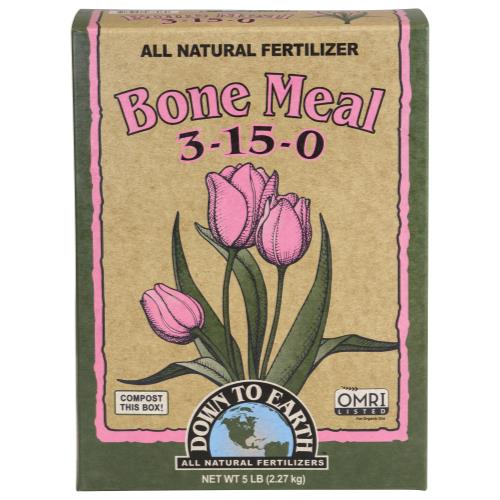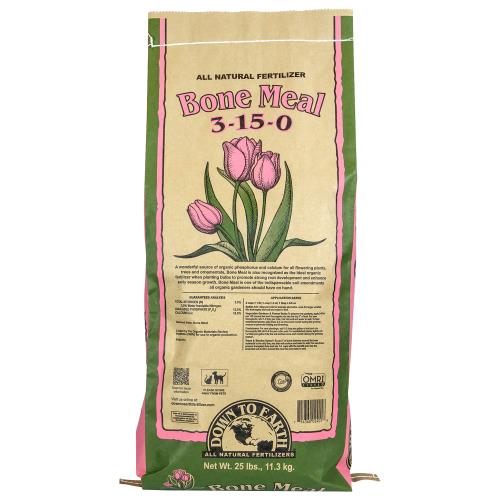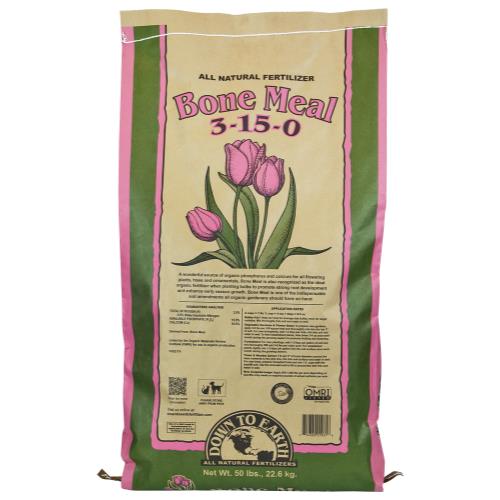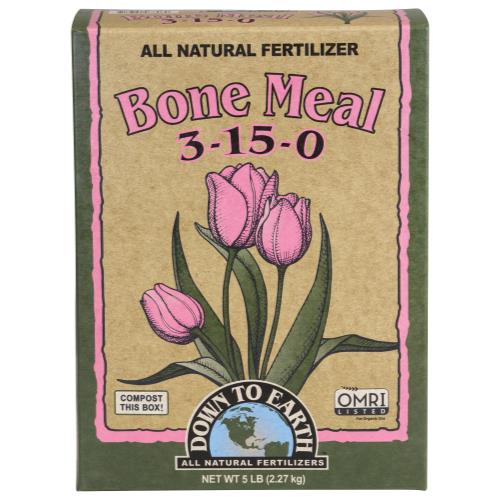Down To Earth
Down To Earth Bone Meal
Down To Earth Bone Meal
20 in stock
Couldn't load pickup availability
Payment options
- Fast Delivery
- Easy Returns
- Secure Checkout
Description
Description
Down To Earth Bone Meal is a natural and organic fertilizer made from finely ground bone material, primarily sourced from cattle bones. This product offers a rich and balanced source of essential nutrients, particularly phosphorus and calcium, which are vital for healthy plant growth. It serves as a reliable soil amendment for a wide range of plants, ensuring strong roots, improved flowering, and increased fruit production.
Key Features:
1. Organic and Sustainable: Bone meal is derived from animal bones, providing a natural and sustainable source of nutrients for plants. It is free from synthetic additives and chemicals, making it suitable for organic gardening.
2. High Phosphorus Content: Bone meal is a renowned source of phosphorus, a crucial nutrient that supports root development, flowering, and fruiting. Adequate phosphorus is vital for overall plant health.
3. Calcium Enrichment: In addition to phosphorus, bone meal contains calcium, which is essential for cell structure and strengthening plant cell walls. It helps to prevent common issues like blossom end rot in tomatoes.
4. Slow-Release Nutrients: Bone meal’s slow-release nature ensures a gradual supply of nutrients to plants. This reduces the risk of over-fertilization and provides a consistent nutrient source over time.
5. Soil Improvement: Regular application of bone meal enhances soil structure, aiding in moisture retention and nutrient availability. It promotes a healthy environment for beneficial microorganisms.
6. Versatile Use: Bone meal is suitable for various plants, including vegetables, flowering plants, fruit trees, bulbs, and shrubs.
Benefits:
• Robust Roots: The phosphorus in bone meal supports the development of strong, healthy root systems, improving plant stability and nutrient uptake.
• Enhanced Blooms: Increased phosphorus content encourages prolific flowering and the production of vibrant, abundant blooms.
• Fruit Formation: Adequate phosphorus contributes to fruit development and can lead to higher yields in fruit-bearing plants.
• Disease Prevention: Calcium helps prevent disorders like blossom end rot and supports the structural integrity of the plant.
• Soil Enrichment: Bone meal enhances soil fertility and microbial activity, contributing to long-term soil health.
• Natural and Safe: As an organic fertilizer, bone meal is safe for the environment and doesn’t pose harm to beneficial insects or wildlife.
Applications:
Down To Earth Bone Meal is suitable for a wide range of applications, including:
• Vegetable Gardens: Ideal for root crops like carrots and potatoes and flowering vegetables such as tomatoes and peppers.
• Flower Beds: Promotes prolific blooms in flowering plants, bulbs, and ornamentals.
• Fruit Trees: Enhances root development and fruit production in apple, pear, and cherry trees.
• Bulbs: Provides essential nutrients for spring and summer bulbs like tulips and daffodils.
• Container Plants: Suitable for potted plants, ensuring strong root growth.
Usage Instructions:
• Pre-Planting: Incorporate bone meal into the soil before planting by mixing 5-10 pounds per 100 square feet.
• Established Plants: For established plants, apply 1-2 tablespoons around the base of the plant and work it into the soil.
• Frequency: Apply bone meal every 4-6 weeks during the growing season, typically from spring to early fall.
• Watering: After application, water the area to help the bone meal’s nutrients reach the plant roots.
• Soil Testing: For precise application rates, consider conducting a soil test to determine your soil’s specific nutrient needs.
Down To Earth Bone Meal is a trusted choice for gardeners who seek to enhance plant vitality, improve flowering, and boost fruit production through organic and sustainable means. It offers balanced nutrition for various plants and contributes to the long-term health of your garden’s soil.
Share



INFORMATION QUESTIONS
FREQUENTLY ASKED QUESTIONS
What is Hydroponics?
Hydroponics is the science of growing plants without soil. The plants thrive on the nutrient-water solution alone. The growing medium merely acts as a support for the plants and their root systems while the solution passes freely. The growing medium, if any, is totally inert.
What types of plants grow best hydroponically?
Anything can be grown hydroponically, but some plants prove to be more space efficient. Some plants we suggest are tomatoes, sweet peppers, hot chilies, lettuce, spinach, squash, cucumbers, broccoli, beans, snow peas, herbs and flowers of all types.
Can you REALLY get better yields/quicker growth?
Absolutely. The plants, when receiving everything they need, tend to be healthier, faster growing and generally more productive. You can expect 30% faster growth with many crops.
What are the watering cycle timelines hydroponic systems?
Once the reservoir is filled with nutrients, it is time to put your hydro system to work! The ease of hydroponics is automation – automation is achieved by putting the pump on a timer according to your watering needs. The watering cycle depends on growth stage, growing medium and hydroponic system. In an ebb and flow or drip system with rockwool as the medium, seedlings, clones and plants in the early vegetative stage require watering only once a day for 15-30 minutes (twice a day for higher temps). Mature, flowering and fruiting plants require a heavier feed and can be fed once a day for 30 minutes (twice a day for higher temps). Typically soiless mixes and coco fiber can be watered for about 15 minutes twice a day, and can be adjusted for heavier feeding during the flowering and fruiting stage or higher temps. ViaStone, Hydroton, Grow Rocks, and Silicate mediums need to be watered more frequently – a constant drip for drip systems, and about 15-30 minutes every 3 hours for ebb and flow systems and can be adjusted for heavier feeding during the flowering and fruiting stage or higher temps. Aeroponic systems require frequent watering cycles; 30-60 seconds every few minutes or a constant spray.
What do I need to test pH? How do I test pH?
pH has a range from 0 (acidic) – 14 (alkaline), with 7 being neutral. A proper hydroponic pH range is between 5.5 to 6.2 for most hydroponic crops. For specific crop pH, check out our Plant Guide. pH must remain within the proper range for good plant health, disease resistance, and proper nutrient uptake. pH is maintained by adding pH Up and pH Down to the nutrient solution. For more information, see the Testssection of our site.
How will the flavor compare to my outdoor grown, organic produce?
The taste may be even better! This is simply due to the fact that the hydroponically grown plants are getting everything they need, when they need it. Don’t be fooled by “hot house” produce grown commercially. The grower’s primary concern is shipability and storage, not flavor. When you grow your own vegetables at home, you can expect nothing less than excellent results. Plus, hydroponically grown produce has the added benefit of a longer shelf life.

